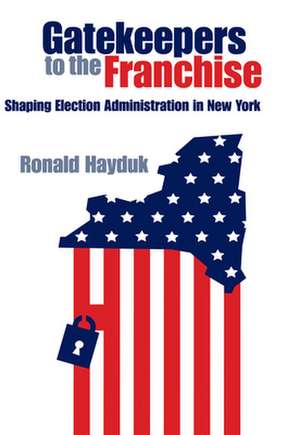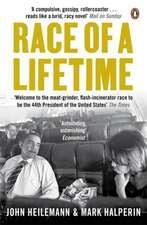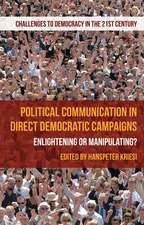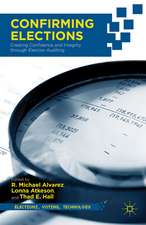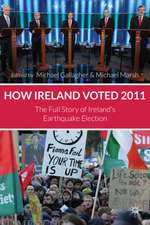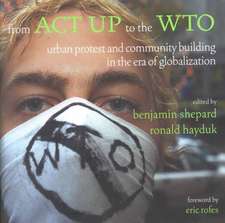Gatekeepers to the Franchise: Shaping Election Administration in New York
Autor Ronald Hayduken Limba Engleză Hardback – 31 mai 2005
The history of democracy in America is the history of the extension of voting privileges from white male property-owners to blacks, to women, and to citizens over eighteen years of age. Yet, the number of United States citizens who actually vote is distressingly low in comparison with voter turnout in other democratic nations. Barely half of the eligible electorate vote in presidential elections and even fewer cast ballots in state and local elections. Poor, minority, and urban communities report the lowest turnout rates, calling into question the reality of American democracy.
Who or what is to blame? Among the many suspects, from stealthy politicians to indifferent citizens, the system of election administration often goes unrecognized. In fact, public officials charged with registering voters and operating the polls on election day literally act as the "gatekeepers to the franchise." By blocking or facilitating a citizen's ability to vote, they shape democratic participation.
In this timely study, political scientist Ronald Hayduk assesses the impact that electoral rules, registration procedures, and on-the-ground operations of New York's state and city election boards have had upon voters' participation and election outcomes over the past 130 years. This in-depth case study documents the ways in which certain practices not only disenfranchise eligible individuals but disproportionately affect low-income and minority groups. It also provides alarming evidence that the debacle in Florida during the 2000 presidential election was not unique. Partisanship and the corruption it fosters have been built into the American system of election administration.
At the same time, however, Hayduk argues that expansive election practices and efficient administration do encourage registration and voting. Bringing his research up to the 2004 presidential election, he evaluates the reforms instituted by the Help America Vote Act. In the conclusion, he offers a candid discussion of other proposed measures for ensuring that all citizens can exercise their right to vote.
Who or what is to blame? Among the many suspects, from stealthy politicians to indifferent citizens, the system of election administration often goes unrecognized. In fact, public officials charged with registering voters and operating the polls on election day literally act as the "gatekeepers to the franchise." By blocking or facilitating a citizen's ability to vote, they shape democratic participation.
In this timely study, political scientist Ronald Hayduk assesses the impact that electoral rules, registration procedures, and on-the-ground operations of New York's state and city election boards have had upon voters' participation and election outcomes over the past 130 years. This in-depth case study documents the ways in which certain practices not only disenfranchise eligible individuals but disproportionately affect low-income and minority groups. It also provides alarming evidence that the debacle in Florida during the 2000 presidential election was not unique. Partisanship and the corruption it fosters have been built into the American system of election administration.
At the same time, however, Hayduk argues that expansive election practices and efficient administration do encourage registration and voting. Bringing his research up to the 2004 presidential election, he evaluates the reforms instituted by the Help America Vote Act. In the conclusion, he offers a candid discussion of other proposed measures for ensuring that all citizens can exercise their right to vote.
Preț: 338.47 lei
Nou
Puncte Express: 508
Preț estimativ în valută:
64.77€ • 70.57$ • 54.57£
64.77€ • 70.57$ • 54.57£
Carte tipărită la comandă
Livrare economică 23 aprilie-07 mai
Preluare comenzi: 021 569.72.76
Specificații
ISBN-13: 9780875803418
ISBN-10: 0875803415
Pagini: 291
Dimensiuni: 152 x 229 x 23 mm
Greutate: 0.56 kg
Ediția:1
Editura: Northern Illinois University Press
Colecția Northern Illinois University Press
ISBN-10: 0875803415
Pagini: 291
Dimensiuni: 152 x 229 x 23 mm
Greutate: 0.56 kg
Ediția:1
Editura: Northern Illinois University Press
Colecția Northern Illinois University Press
Recenzii
"[Hayduk] explains the importance of the election administration reform movement in the United States-why it is needed and what effect it might produce."—Michael Traugott, University of Michigan
"Hayduk's message is well wrought and ought to be heeded. Recommended not only to specialists but to virtually anyone interested in why voter turnout is low, why voters are cynical or apathic, and why certain groups vote at hight rates than others."—Election Law Journal
"Makes a significant contribution to the emerging subfield of election administration, injecting some badly needed evidence into the access-versus-integrity debate, which all too often rests on intuitions rather than facts."—American Politics
"Hayduk's message is well wrought and ought to be heeded. Recommended not only to specialists but to virtually anyone interested in why voter turnout is low, why voters are cynical or apathic, and why certain groups vote at hight rates than others."—Election Law Journal
"Makes a significant contribution to the emerging subfield of election administration, injecting some badly needed evidence into the access-versus-integrity debate, which all too often rests on intuitions rather than facts."—American Politics
Notă biografică
Ronald Hayduk, is Associate Professor of Political Science at the Borough of Manhattan Community College—City University of New York.
Cuprins
Table of Contents
Acknowledgments
Introduction—The 2000 Election: Why Election Administration Matters
1. Election Administration: A Missing Piece of the Puzzle of Voter Participation
2. Historical Roots of Election Rules and Practices in New York
3. The Impact of Election Rules and Practices in New York State, 1984-2004
4. The New York City Board of Elections: From Byzantine to Antiquated, 1984-1993
5. The Specter of Vote Fraud: How Restrictive Practices Helped Elect Mayor Giuliani
6. Florida's Wake: Elections and Reform Since 2000
7. Implications for Policy
Notes
Selected Bibliography
Index
Introduction—The 2000 Election: Why Election Administration Matters
1. Election Administration: A Missing Piece of the Puzzle of Voter Participation
2. Historical Roots of Election Rules and Practices in New York
3. The Impact of Election Rules and Practices in New York State, 1984-2004
4. The New York City Board of Elections: From Byzantine to Antiquated, 1984-1993
5. The Specter of Vote Fraud: How Restrictive Practices Helped Elect Mayor Giuliani
6. Florida's Wake: Elections and Reform Since 2000
7. Implications for Policy
Notes
Selected Bibliography
Index
Descriere
The history of democracy in America is the history of the extension of voting privileges from white male property-owners to blacks, to women, and to citizens over eighteen years of age. Yet, the number of United States citizens who actually vote is distressingly low in comparison with voter turnout in other democratic nations. Barely half of the eligible electorate vote in presidential elections and even fewer cast ballots in state and local elections. Poor, minority, and urban communities report the lowest turnout rates, calling into question the reality of American democracy.
Who or what is to blame? Among the many suspects, from stealthy politicians to indifferent citizens, the system of election administration often goes unrecognized. In fact, public officials charged with registering voters and operating the polls on election day literally act as the "gatekeepers to the franchise." By blocking or facilitating a citizen's ability to vote, they shape democratic participation.
In this timely study, political scientist Ronald Hayduk assesses the impact that electoral rules, registration procedures, and on-the-ground operations of New York's state and city election boards have had upon voters' participation and election outcomes over the past 130 years. This in-depth case study documents the ways in which certain practices not only disenfranchise eligible individuals but disproportionately affect low-income and minority groups. It also provides alarming evidence that the debacle in Florida during the 2000 presidential election was not unique. Partisanship and the corruption it fosters have been built into the American system of election administration.
At the same time, however, Hayduk argues that expansive election practices and efficient administration do encourage registration and voting. Bringing his research up to the 2004 presidential election, he evaluates the reforms instituted by the Help America Vote Act. In the conclusion, he offers a candid discussion of other proposed measures for ensuring that all citizens can exercise their right to vote.
Who or what is to blame? Among the many suspects, from stealthy politicians to indifferent citizens, the system of election administration often goes unrecognized. In fact, public officials charged with registering voters and operating the polls on election day literally act as the "gatekeepers to the franchise." By blocking or facilitating a citizen's ability to vote, they shape democratic participation.
In this timely study, political scientist Ronald Hayduk assesses the impact that electoral rules, registration procedures, and on-the-ground operations of New York's state and city election boards have had upon voters' participation and election outcomes over the past 130 years. This in-depth case study documents the ways in which certain practices not only disenfranchise eligible individuals but disproportionately affect low-income and minority groups. It also provides alarming evidence that the debacle in Florida during the 2000 presidential election was not unique. Partisanship and the corruption it fosters have been built into the American system of election administration.
At the same time, however, Hayduk argues that expansive election practices and efficient administration do encourage registration and voting. Bringing his research up to the 2004 presidential election, he evaluates the reforms instituted by the Help America Vote Act. In the conclusion, he offers a candid discussion of other proposed measures for ensuring that all citizens can exercise their right to vote.
